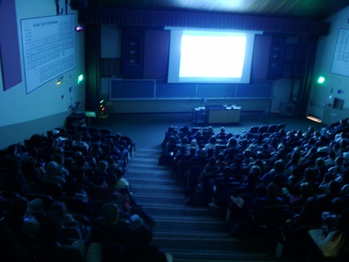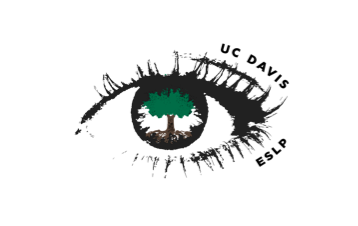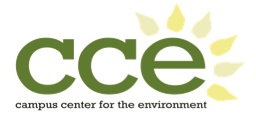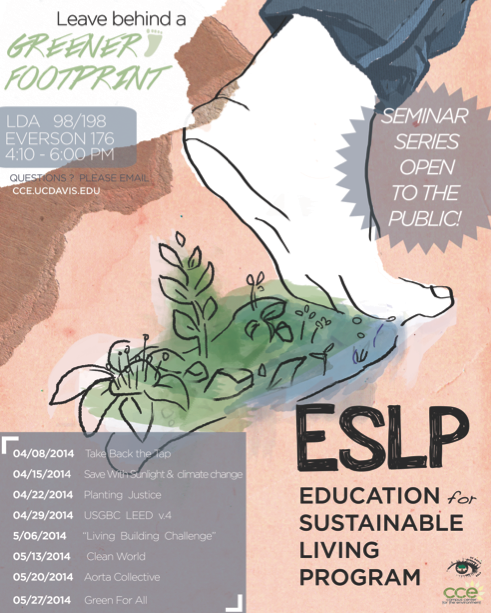Spring 2014 LDA 98 (lower division) CRN 43965 LDA 198 (upper division) CRN 28587
T 4:10-6:00 PM (Lec) EVERSON 176 W 4:10-5:00 (Dis) HUNT 166
2014 ESLP Syllabus .pdf ESLP 2014 ART FLYER.pdf ESLP_ART_2014_teams.pdf
ESLP Flyer 2013 Full Page.pdf ESLP flyer spring 2012 (2).pdf ESLP 2011 FLYER.pdf 2011 ESLP Syllabus.pdf 2010 ESLP Syllabus.pdf 2009 ESLP Syllabus.doc ESLP_Syllabus_2008.doc
_
2014 Lecture Topics and Speakers:
04/08/2014 Tia Lebherz
Take Back the Tap
Banning the Bottle on Campus
04/15/2014 Damien Luzzo
SaveWithSunlight & climate change
non-profit, affordable solar energy
www.savewithsunlight.com
04/22/2014 Planting Justice
non-profit urban gardens
food justice, economic justice, sustainable-local food justice
www.plantingjustice.org
04/29/2014 Susan Rainier
USGBC LEED v.4
5/06/2014 Susan Rainier
“Living Building Challenge”
05/13/2014 CleanWorld (Field trip)
Biodigestor partnering with UCD
Converting organic waste to renewable energy & soil enhancement products
05/20/2014 Aorta Collective
Anti-capitalism for collectives and communities workshop
How to build communities and movement based in shared resources and sustainability for everyone
05/27/2014 Green For All
National Organization, Advocacy
Building a Green Collar Economy
ART TEAMS 2014: Tentative- more to come
*Food waste Recovery *Davis Community Farm- George Hubert *Expanding Compost Collection *Fossil fuel divestmen
For questions or more information, please contact [email protected]
What is ESLP?
The Education for Sustainable Living Program (ESLP) is a collaborative interdisciplinary effort to realize a sustainable community throughout the University of California. This course is structured as a 2-unit seminar series, hosting guest lectures by renowned educators, authors, environmentalists, and progressive thinkers. Lectures are open to the public free of charge to encourage collaboration between the campus and local community. The course encourages reflection upon and analysis of the principles of sustainability (EQUITY, ECONOMY, ENVIRONMENT, EDUCATION), and is designed to encourage dialogue between students, faculty, staff, administration, local community, and the entire UC system.
For 2 additional units, students have the option to form Action Research Teams (ART's) in partnership with guest lecturers, faculty, administration, and community members to implement tangible change. These groups focus on campus specific issues such as sustainable transportation, socially & environmentally preferable purchasing, energy consumption reduction, waste reduction/prevention, and green building. Such experiential learning inspires participants to internalize the concept of sustainability, and carry it in practice beyond academia into a greater society. Students may enroll in this course to receive two units of academic credit for selected departments, or may opt to take the course for four units by participating in the Action Research Teams.
Additionally, this lecture series is open to everyone in the Davis community.
We are putting out a call for ART (Action Research Team) leaders! This is a great opportunity to work with students, staff, and faculty to implement change on the UC Davis campus. If you are interest in leading an ART come to the farmers' market on Saturdays at 12pm in Winter Quarter 2013 and email Emili ([email protected])
Objectives for Course
I. Explore the meaning of "sustainability."
II. Explore specific ways to apply the concepts of sustainability to daily lives and to our university.
III. Encourage communication and collaboration between all members of the campus community to envision, initiate, and enact tangible change locally, nationally, and globally.
IV. Challenge participants to think beyond the short term interests that currently drive global systems; examine how our present decisions and action affect future generations; apply a cross disciplinary systems level analysis to our community decisions and consider their regional and global effects.
Schedule for 2013
*The speakers and schedule are subject to change due to reasons outside of our control
April 3: Introduction to Sustainability & Sign Up for ARTs ART Leaders: Maisie Borg (Aquaponics), Issy Demilian (E-Waste Recycling), Tanzi Jackson Dani Doedens and Ian Lee (Coal Divestment), Melanie Lataste & Derek Downey (Bee Sanctuary: a collaborative space for people and bees), Melanie Lataste (Seeds on Wheels)
April 10: Marcus Eriksen & 5 Gyres Institute Marine Pollution and Plastic Art Gallery
April 17: Alberta Tar Sands and Tar Sands Blockade Garth Lenz, Photojournalist
April 24: Aquaponics Erick Mandu from Kijani Grows http://www.kijanigrows.com/
May 1: Globalization, Post-Capitalism, and the Koch Brothers Victor Menotti from The International Forum on Globalization http://www.ifg.org/
May 8: Sustainable Agriculture Panel Full Belly Farm, Ryan Galt, Mark Van Horn, Jeff Mailes, TBA
May 10, 11, 12: Whole Earth Festival ESLP community members and Action Research Teams are encouraged to staff a booth at the Whole Earth Festival (aka 'WEF') and generally, enjoy and learn from the festival.
May 15: Indigenous Rights and Environmental Justice Conversations with the Earth
May 22: Social Justice Activism Panel TBA
May 29: ART Presentations
June 5: DIY, “Learn your Community and Campus Resources Day” Featuring the Craft Center and Aggie Re-Use Store
Action Research Teams for 2013, Student and Community Lead
-
Aquaponics - Maisie Borg, [email protected]
-
E-Waste Recycling - Issy Demilian
-
Volunteer Gardening Team -
-
Seeds on Wheels - Melanie Lataste, [email protected]

Help the Davis Seed Savers Alliance build a portable seed cabinet structure “Seeds on Wheels” with recycled materials for the Domes Seed Library! We are looking for a user-friendly design with a bike hauling system. Then, reorganizing the seeds, figuring out interesting seed categories and creative labels. We will finalize the project with a seed event introducing the Domies and Davis community to the “Seeds on Wheels” Lending Library. The goal is to provide a convenient and free access to seed everywhere in Davis. The Davis Seed Savers will teach one aspect of saving seed each week. No specific skills are required to participate except enthusiasm and creativity!”
-
The Davis Bee Sanctuary: a collaborative space for People & Bees - Melanie Lataste & Derek Downey, [email protected], [email protected]

Help the Davis Bee Collective transform the Davis Bee Sanctuary garden into an educational and creative space introducing native bees & their habitat, 3 different hive designs & natural beekeeping, medicinal herbs, and permaculture techniques. Map making, native bee habitat building and sign designing are the core features of the project, but students can also experiment natural beekeeping and permaculture gardening depending on their interest. The goal is to invite everyone to experience the joys of observing and learning about bees in a people-bee friendly environment. We will finalize the project with an event presenting the Bee Sanctuary to the Davis Community. For those who are afraid or allergic to bee stings, the designing, map and sign making do not overexpose students to bee encounter.
-
UC Fossil Fuel Divestment Campaign with CSSC - Ian Lee, Dani Doedens & Tanzi Jackson, https://www.facebook.com/pages/Fossil-Free-UC-Davis/218054671666295?fref=ts
-
Wildlife Survey (Sustainable Research Area) - Lucas Hill, [email protected]
-
Davis Dirt Radio - Anna-Ruth Crittenden, [email protected]
-
"UCD Food Recovery Network" - Stefanie Scott & James Kreidler, [email protected]
Help feed the community and make UC Davis more sustainable! The Food Recovery Network (FRN) is actually a nation-wide organization that's goal is to help with diverting overproduced and left over food from university food systems to places that help feed those that are in need (more info http://www.foodrecoverynetwork.org ). UC Davis has just recently become a chapter of the Food Recovery Network, and we are officially launching the program this Spring quarter through the UCD FRN club. The goal is to have students participating in the system by delivering the food from the campus dining commons to the donation locations, and have fun doing it. Participants will also be able to help with developing the system (finding out ways to improve it), researching new places and creative ways to deliver food and feed more people, figuring out how to keep the system going over the Summer, and are encouraged to come to club meetings. It is preferred that students have a car to make deliveries, but biking will suffice.
Schedule for 2012
*The speakers and schedule are subject to change due to reasons outside of our control
4/4 - Introduction and World Cafe
4/11 - John Harvey and Mitch Sears + ART introductions http://cee.engr.ucdavis.edu/faculty/harvey Mitch Sears is the City of Davis Sustainability Programs Coordinator
4/18 - Bea Johnson Minimizing Impact http://zerowastehome.blogspot.com
4/25 - CSSC Move to Amend and End Coal Campaigns + Bruce Reznik Lobbying http://www.pcl.org/about/breznik.html http://www.sustainabilitycoalition.org/tag/move-to-amend http://www.sustainabilitycoalition.org/_featured/spotlight-on-the-cssc-end-coal-campaign
5/2 - Melissa Nelson Indigenous Perspectives http://www.bioneers.org/presenters/melissa-nelson
5/9 - Melanie Madden Agricultural Land Preservation
5/16 - DIY Week
5/23 - Garth Lenz The Real Price of Oil http://www.ted.com/talks/garth_lenz_images_of_beauty_and_devastation.html
5/30 - Portland City Repair Celebration http://cityrepair.org/
6/6 - Sustainable Scavenger Hunt for Prizes, End of the quarter evaluations and discussion
Schedule for 2011
3/30 - Nikki Henderson 2010 ELLE Gold Award and executive director, People’s Grocery in West Oakland, California
4/06 - World Cafe and ART introductions
4/13 - Dr. Geerat Vermij Intersections of Ecology and Economy 1992 MacArthur Fellow and Distinguished Professor of Geology, UC Davis
4/20 - Marcela Oliva - The End of Education - as we know it Professor, Architecture and Environmental Design, L.A. Trade Technical College
4/27 - Ciudad de Luces and Micah Posner Ciudad de Luces- Latino bicycle collective from LA Micah Posner- director, People Power
5/4 - Chris Jones author of a Carbon Footprint Calculator
5/11 - Josiah Cain Principal, Design Ecology
5/18 - Greywater Guerillas
educators, designers, builders, and artists
5/25 - Kim Stanley Robinson
2008 Time “Hero of the Environment” and science fiction writer (author of best-selling Mars Trilogy)
6/01 - Wrap-up and Action Research Team Presentations
Schedule for 2010
3/31 - Course Overview and Action Research Team Introductions
4/07 - Food Waste and Recovery feat. DIVE: A film about living off of America's waste and a panel of community food waste/recovery leaders.
4/14 - Katie Maynard
4/21 - Engaging with Disengagement
4/28 - Transportation
5/05 - Coalition of Immokalee Workers
5/12 - Community Services Unlimited
5/19 - Dr. Tina Jeoh - Biofuels
5/26 - TBA
7/03 - Action Research Team Presentations and Wrap-up
Schedule for 2009
4/01 - Course Introduction & ART Introductions
4/08 - Erik Knutzen - Urban Homesteading
Author, activist, and blogger extraordinaire
4/15 - Matthew Wolf-Meyer - Medical Anthropology
Associate Professor of Anthropology at UC Santa Cruz
4/22 - Frank Loge - Why Your Wastewater May Save Your Life
Associate Professor of Civil and Environmental Engineering at UC Davis
4/29 - Green For All - Creating a Green Collar Economy
5/6 - Panel Discussion on Energy
5/13 - John de Graaf - Taking Back Your Time
Author, activist, filmmaker
5/20 - Sharon Davison
Educator, activist, progressive thinker
5/27 - Stephen Wheeler -
Assistant Professor of Landscape Architecture and Environmental Design at UC Davis
6/03 - Action Research Team Presentations
Schedule for 2008
04-01 - Course Introduction
04-08 - Kevin Wolfe - Sustainable Living
Founder of N Street Co-Housing
 04-15 - Margot Higgins - Biomimicry - Nature as a Model, Measure, and Mentor
04-15 - Margot Higgins - Biomimicry - Nature as a Model, Measure, and Mentor
04-22 - Joan Ogden - Hydrogen and Society
Associate Professor, Environmental Policy and Planning, UC Davis
04-29 - Jason Mark - Sustainable Food Systems
Author, activist, and farmer
05-06 - Veg Rev - Vegetable Oil Fuel Systems and Demonstration
05-13 - Ellis Jones - Socially Responsible Consumption
Professor of Sociology, UC Davis
05-20 - Nikki Henderson - Social Justice as a Pillar of Sustainability
Master's Student, UCLA
05-27 - Action Research Team Project Presentations
06-03 - Gary Snyder - Deep Ecology
Poet, Deep Activist
2007 course information has disappeared
Action Research Teams (ART's)
The purpose of these “action research teams” is to involve students in a process of experiential learning by collaborating with faculty, staff, administration, and community members to implement tangible change at our university. Action Research Teams are lead by graduate students, students, or even community members, and meet weekly, outside of scheduled class time. Students earn an additional 2-units (total of 4 units w/ lecture and ART) for participation in an ART. Specific areas of focus could include but are not limited to:
-
Food Systems & Agriculture
-
Community Development
-
Green Building
-
Transportation
-
Renewable Energy
-
Natural Resource Management
-
Environmental justice
-
Public policy
-
Religion and spirituality
-
Sustainable Consumerism
The Education for Sustainable Living Program is requesting proposals from graduate students, undergraduates, or community members to lead action oriented research groups related to sustainability in our campus community. If you are interested in coordinating an “action research team” please express interest TODAY! If interested in leading an ART, we ask that a general project proposal (proposal form attached below) be submitted to Stephanie Castle at [email protected] by Wednesday, March 17th. After submission, proposals will be reviewed and organizers for the course will work with you to develop specific project guidelines by the end of winter quarter. Please contact Stephanie Castle ([email protected]) for more information! art 2011.pdf ART+application+2011.docx
2013 Action Research Teams
-
Seeds on Wheels - Melanie Lataste, [email protected]
-
Bee Sanctuary: a collaborative space for People & Bees - Melanie Lataste & Derek Downey, [email protected], [email protected]
2011 Action Research Teams
*To Be Announced
2010 Action Research Teams
-
Promoting Sustainability on the Radio - Dani Lee and Natalie Yahr, [email protected]
-
Agriculture, Food, and Intersectionality: Food Justice and Sustainability - Liz Fitzgerald and Janaki Jagannath, [email protected], [email protected]
-
Inspiring Appropriate Lighting - Allen Doyle, [email protected]
-
Volunteer Gardening Team - Lauren Cockrell, [email protected]
-
Awareness, Availability, and Action with the Campus Center for the Environment - Lauren Jabusch, Jessica Bray, and Will Klein, [email protected]
-
First-Year Dorm Gardens - Sarah Stockdale, Will Klein, and Kara Fleshman, [email protected]
-
Orchard Park Gardens - Christopher Salam, [email protected]
2009 Action Research Teams
-
Developing the Low-Impact Vehicle Education (LIVE) Center - Bryan Jungers, [email protected]
-
Green Building at the Domes - Bryan Jungers, [email protected]
-
Gleaning Project - Maggie Lickter and Liz Fitzgerald, [email protected]
-
SolArising - Brennan Bird, [email protected]
-
Experiments with Collective Transportation - Christopher Salam, [email protected]
-
Strategic Communication - Isabell Call and Sara Diamond, [email protected]
-
Organizing in the Community - Lauren Jabusch and Jessica Bray, [email protected]
-
Consensus Documentary - Jessy Schmidt - [email protected]
-
Local Food Week/Real Food Week - Danielle Lee and Jen Heinlein, [email protected]
2008 Action Research Teams
-
Oxen Powered Farming-Shosha Capps, [email protected]
-
Sustainable Food Systems for UC Davis- Maggie Lickter, [email protected]
-
Sustainable Housing- George Hubert, [email protected]
-
Bicycle Education Documentary- Ken Celli, [email protected]
-
Our Salt March?: Thinking about Change - Tobias Joel, [email protected]
-
Sustainable Campus Transportation Design Collective - Chris Congleton, [email protected]
-
Revive the Campus BUG (Bicycle User's Group)
-
Summer Freshman Orientation: 5 minute film on biking convenience (and safety?)
-
Social Costs and Benefits of Travel Choices Focus Group Study
-
Car-Free Downtown Davis on Weekends
-
Design and Build Covered Bike Parking
-
Build some Bike Trailers or a 7 person Bike Bus
-
Sustainable Crafts with Kids- Aisha Young, [email protected]
Tobias here—this ART will really be a lot of fun. We will address the elephant in the room. That is, slow down and look critically at the change we (as a movement) are trying to enact, and explore the modes of thought underpinning the problems we work to solve. That means taking responsibility for their causes and, from that point, considering how we can move forward. As we dig into these issues we will awaken our movement to a renewed introspection and, moreover, self-doubt. The goal is NOT to simply devise some homogeneous, systemic understanding of "sustainability". That would only replace the artificiality of mainstream culture with our own home-grown myths. Instead we will create a space to recognize sustainability's plurality of meanings and consider, What are we actually trying to do?
We will read one short (but rich) text a week and meet to discuss. Each participant will produce a small reflection on these issues by the end of the quarter (an essay, poem, drawing, performance piece—whatever you like!). Those will be the only assignments. It's about thinking. The flavor will be laid-back, calm and happy. Finally, the ART will organize a public demonstration in which all of ESLP can participate. That will be fun. EVERYONE IS WELCOME TO PARTICIPATE AND COME TO ANY MEETINGS.
Tentative syllabus (readings made available in a reader): Salt March Syllabus.pdf
Presentation for ESLP 27 May: http://strangedays.viewbook.com/salt_marching
Project Titles, followed by contact person for those projects:
Skyler ([email protected])
Chris C ([email protected])
Chris S ([email protected])
Will ([email protected])
Topics for Action Research Teams from 2007 and 2006
-
Pedal Power - Built a pedal powered work desk to run your laptop while you cycle.
-
Open Sustainable Modern Media Distribution (Video/Audio Casting, aka Podcasting) - Creation & Distribution of lectures via modern media using Free Open Source tools
-
Green Business - Organized a Panel of Professionals on Green Business in Practice
-
Sustainable Food Systems - Surveyed Coffee House patrons about their preferences and knowledge of Organic, Fair Trade food.
-
Sustainable Food Systems II - How far does it take food to get to the table, and how do you measure the global impact.
-
Campus GreenMap
-
Sustainable Food Systems
-
Campus Transportation
-
Green Building (LEED)






